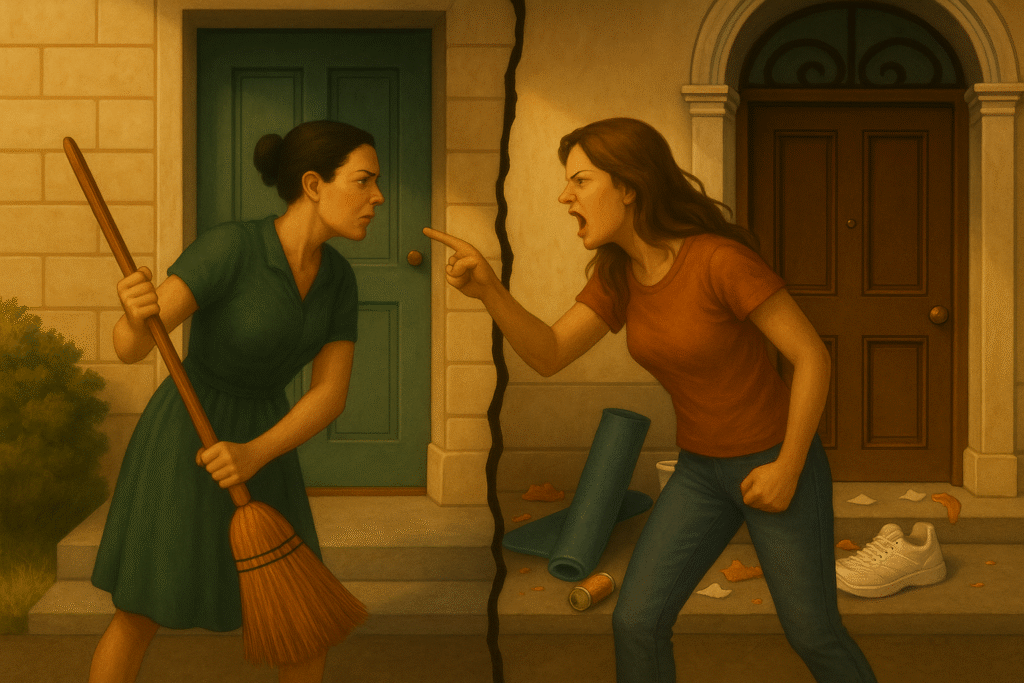Brooms and Boundaries
New notification: “Ma’am, I can’t come today. My mother is very ill. At the hospital.”
Karen rolled her eyes so hard, it’s a miracle they stayed in her skull. Kelly didn’t show up again, it was her fourth leave this month.
“Ugh, personal emergencies. So inconvenient.”
Karen felt betrayed. She stood in the middle of her marble-tiled kitchen, arms folded, staring at the overflowing sink and the breakfast mess as if sheer willpower would scrub it all away.
She poked her phone screen aggressively. No reply.
“Well, someone has to do something,” she muttered. “And that someone is not going to be me.”
Donning oversized sunglasses and a velour tracksuit two seasons too late, Karen strutted outside, determined to find a replacement. Surely someone in the neighborhood had a spare cleaning lady they could loan for an hour.
That’s when she spotted her.
A woman in a crisp sky-blue kurta sweeping her front porch three houses down. Clean, coordinated, and efficient. Her sweeping game? Elite.
Karen beamed. Jackpot.
She marched right up the driveway like a woman on a mission—and absolutely no self-awareness.
“Hey there!” Karen chirped.
The woman looked up, a gentle smile on her lips. “Hi?”
Karen didn’t wait. “So, my maid ditched me today—hospital drama, long story—and I’ve got a kitchen that looks like a war zone. Once you’re done here, would you mind coming over to clean my place? I can pay.”
The broom paused mid-sweep.

“I’m sorry?” the woman asked.
Karen gestured like she was explaining 1+1. “You’re already in the zone. Just a couple more rooms down the block, same routine. I’ll even double your rate.”
The woman’s polite smile didn’t budge, but her eyes sharpened. “I think there’s been a misunderstanding. I’m Suzanne. This is my house. I’m not a maid.”
Karen blinked. “Wait, you live here? And you’re… cleaning?”
Suzanne nodded. “Yup. Shocking, right? A woman voluntarily picking up a broom in her own house.”
Karen let out a dry laugh. “I mean… people like us usually have help.”
Suzanne raised an eyebrow. “People like us?”
“You know, educated, modern, not… domestic types,” Karen offered, like she was handing out compliments.
Suzanne leaned against her broom. “So, sweeping your own porch is a crime against modern womanhood?”
Karen huffed. “I just think it’s weird, that’s all. Why would anyone choose to do this stuff?”
“Because I have hands and a spine,” Suzanne replied coolly.
Karen smiled thinly, mistaking sarcasm for agreement. “Still, since you’re already used to it, why not help me out? I have garbage everywhere. It’ll be easy for you—you’re clearly trained.”
Suzanne’s smile froze. Inside her, something cracked—like a long-sealed box of memory bursting open. Her mother’s blistered hands. Her father skipping meals. Her teenage self-studying by candlelight because cleaning shifts paid for college but not electricity.
“I’m not illiterate,” she said softly. “I have a double master’s degree.”
Karen blinked. “Oh. So now you talk with attitude?”
“No, Karen,” Suzanne said sweetly. “I talk with clarity. Try it sometime.”
Karen scoffed. “Wow, you’re really playing the superiority card, huh? But clearly, you’re the housewife-type. I’m more of a gym-at-10, brunch-at-noon person. We’re just wired differently.”
Suzanne raised a brow. “So… someone who mops her own floor is what? Emotionally bankrupt?”
“No,” Karen smirked. “Just broke. Look, I’ll pay you more. Win-win.”
Suzanne stared. “Let me get this straight—you go to the gym, spend money to sweat, but won’t sweep your own living room for free?”
Karen flipped her hair. “Why would I, when someone else can?”
Suzanne deadpanned, “Right. Let the help handle the crumbs of capitalism.”
Karen sighed. “I don’t have time for this. I’ve got spin class in an hour. Just come over when you’re done playing domestic goddess.”
Suzanne paused. Then, slowly, she said, “You know what’s funny?”
Karen folded her arms. “What?”
“You think cleaning is a class marker. But you’re stomping around in head-to-toe athleisure, yelling at strangers, and acting like you’re in a reality show called ‘Desperate Housewives of Denial.’”
Karen gasped.
Suzanne leaned in. “And I don’t associate with lower-class people who treat others like walking mop buckets.”
Karen’s jaw dropped. “Did you just call me lower class?”
“Well, you’re certainly not upper anything in attitude.”
Karen opened her mouth to retort.
But Suzanne held up a hand. “Before you get creative, let me add something. I’m not just a woman who sweeps her own porch—I’m the Chief of Police for Pennsylvania District.”
Karen’s jaw closed with an audible snap.
“And since your kids go to Crestwood High,” Suzanne added, “I’ll be sure to have a word with their principal—remind him to include basic human decency in the school curriculum.”
Karen was frozen.
“Oh,” Suzanne added, almost as an afterthought. “And you might want to clean your own house. Your children shouldn’t grow up thinking kindness is something you hire.”
Karen stood in her messy kitchen, broom in hand, wondering how she’d made it this far in life while learning so little.
She swept—awkwardly, inefficiently, but honestly. As the dust swirled and settled, so did something inside her.
Suzanne was out walking her dog when she saw Karen waddling toward her in yoga pants and a half-sincere smile.
“Hi,” Karen said, catching her breath. “I just… wanted to say I’ve been cleaning my house all week.”
Suzanne nodded. “Nice. Hope the mop survived.”
Karen smiled faintly. “It did. Barely. And I’ve been talking to my kids. About respect. Work. People.”
Suzanne raised an eyebrow.
“I just wanted to thank you,” Karen said. “For sweeping more than just your porch.”
Suzanne smiled. “Don’t thank me. Just don’t forget.”
Comment Question:
Have you ever judged someone based on appearance — only to realize you were completely wrong?
What does “real class” mean to you: wealth, status… or the way you treat others?
Let’s talk humility, perception, and the lessons we don’t learn in school.
